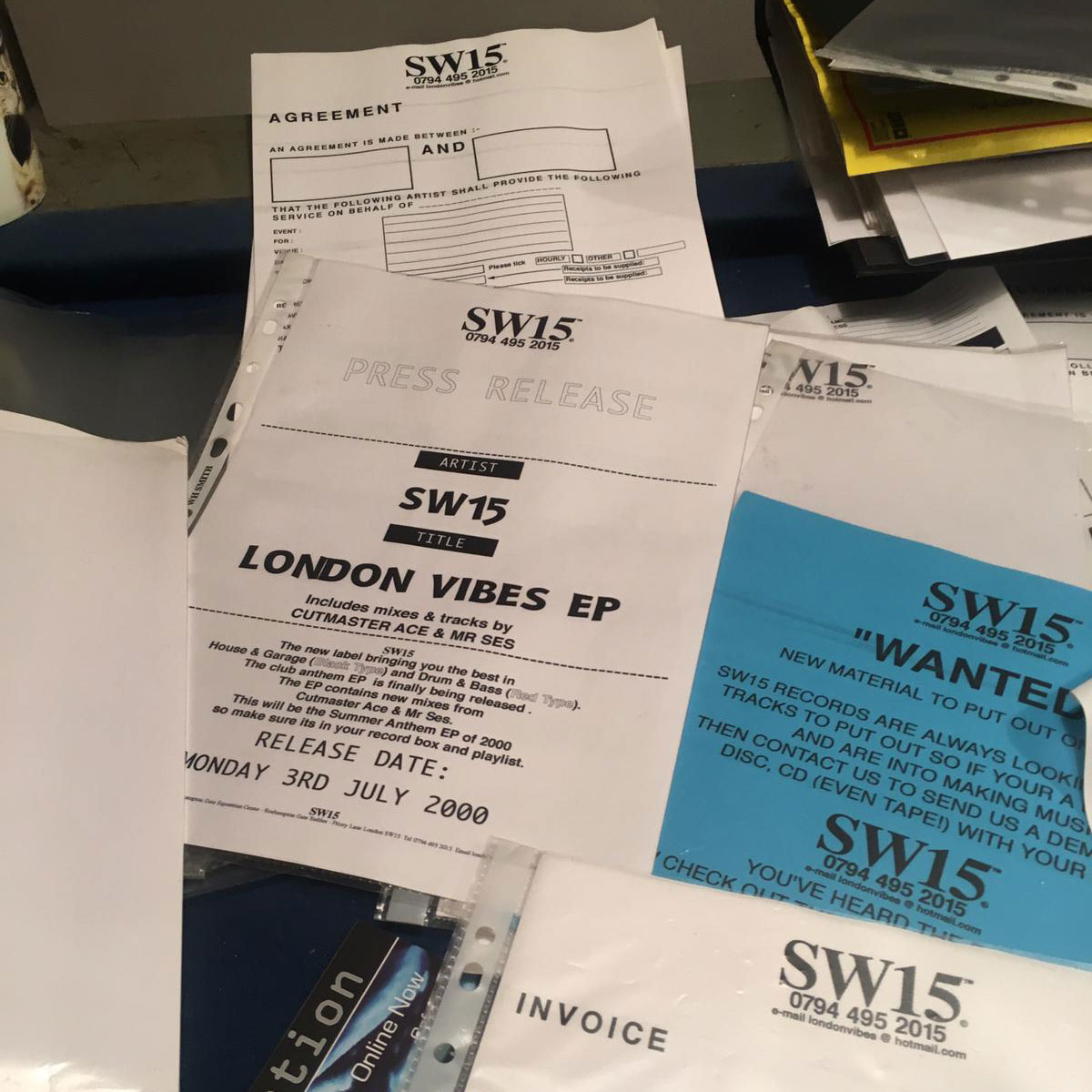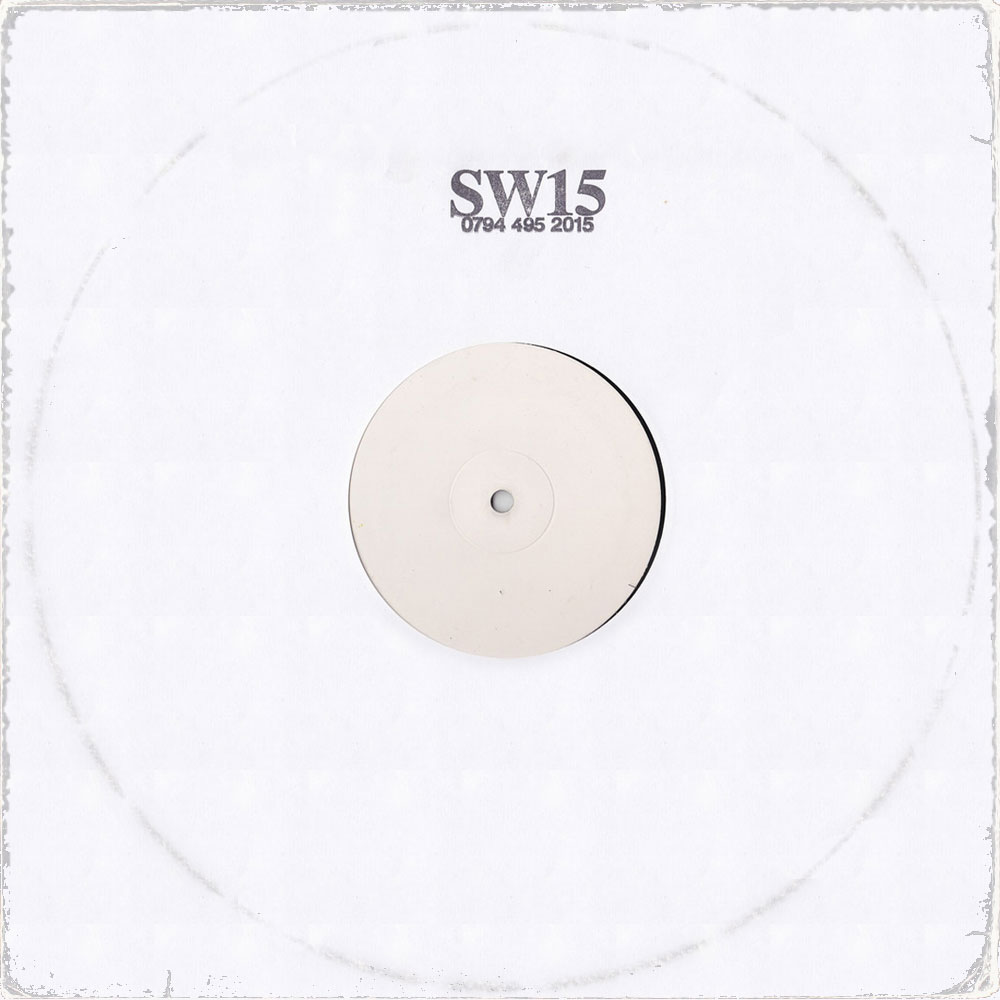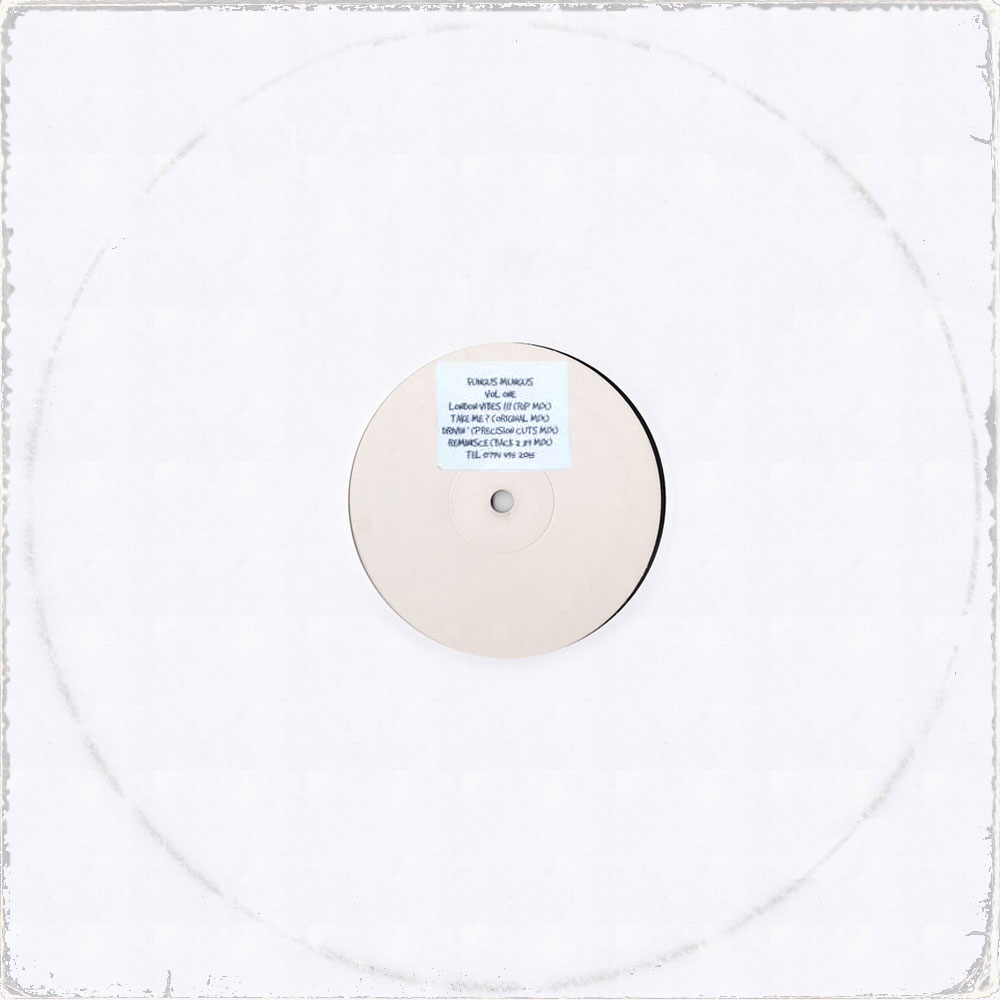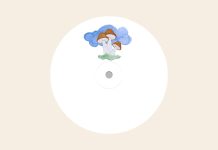London Vibes is a record I’ve played many times over the last four years, but I’ve never actually held a copy of it in my hands before.
That’s not so rare in the digital age — some producers will never hold a physical copy of any record they make — but London Vibes pre-dated all that. It’s a legendary UK Garage white label, and maybe the most coveted of them all. A monster of a record from the turn of the Millennium and constant fixture on lists of the rarest underground records in history, even YouTube rips were pretty sketchy and partial and many DJs have despaired of ever finding a copy of their own. It has a Have/Want ratio on Discogs of 37/883 — that is, nearly 1000 people want it and less than 40 claim to have a copy. Even this self-reported number is probably inflated by the claims of boasting collectors, though the prices — ranging from a few to several hundred dollars — are legit.
And all those times we’ve played these terrible YouTube rips, we never knew who made it. We actually didn’t even know its proper name. Squinting at tiny JPGs of hand-written labels, some called it “Fungus Mungus,” some called it “London Vibes” after the first track. Curiously, the artist name on Discogs was listed as “SW15,” though none of the four tracks were credited to “SW15” at all. “SW15” was also the label name.
It was engrossing, like a mystery, only the plot was too thin for a novel. Who would make the most bomb-ass speed garage record you ever heard and then refuse to take credit for it? And leave just enough clues to confuse everyone about the person that did?
Until pretty recently London Vibes was a record without a history. Most people heard the title track or “Escape” played in DJ mixes and DJ sets, but DJs who had one of the few copies in existence were curiously tight-lipped about it. Maybe they were guarding their secret weapons, the way Chicago DJs used to slap blank labels over the stickers of their exclusive cuts. Maybe it was made by some big-time DJ hiding in plain sight, afraid of being chased for unlicensed samples swiped in a youthful indiscretion. Or maybe they just didn’t know.
The truth, it turns out, is simpler than any of that. The person who made it had no idea anyone was listening to him.
 #JACKED: This was originally published in 5 Mag Issue #196 featuring Demuir, Ralphi Rosario, London Vibes and more. Support 5 Mag by becoming a member for as little as $1 per issue and get every issue in your inbox right away!
#JACKED: This was originally published in 5 Mag Issue #196 featuring Demuir, Ralphi Rosario, London Vibes and more. Support 5 Mag by becoming a member for as little as $1 per issue and get every issue in your inbox right away!
The man who made this holy grail of Garage records sent me an email about two and a half years ago. There wasn’t an introduction — he just sent me a link, with no hype, no explanation or signature.
I had no idea what I was reading. At the top was a picture of a guy in a sombrero; underneath it he talked about playing salsa music. Then, a few paragraphs down, he mentioned making a white label called London Vibes. I mostly knew the record by the alternate name, Fungus Mungus Vol 1, so it took a minute for this to sink in.
After reading to the end, I had no doubt that his claim was true. This was the guy who made the record.
London Vibes is one of those “holy grail” type of records. If you say you have a copy, certain people will look at you with something like lust in their eyes. And after 19 years, here was the mysterious figure who made it, just casually announcing himself.
All those times we’ve played these terrible YouTube rips, we never knew who made it. We actually didn’t even know the record’s proper name.
His name is Orion (pronounced Ore-on — “my parents were hippies back in the day”), aka “Sounds of the DJ Orion,” aka “Cutmaster Ace,” the artist credited for the tracks on the A side of London Vibes. To hear him tell it, Orion had mostly been in the dark about the wide audience that rediscovered his record until about a year earlier, when a label finally tracked him down to inquire about repressing it.
The label, he told me then, was called Shuffle ‘n’ Swing. I don’t think the name meant anything to me at the time. It’s a platform started in 2018 to share & discuss UK Garage. That later inspired a label that reissued and recirculated some of the most rare and most choice bits of UK Garage from history. After hearing their reissue of Sasha Love’s “Unbelievable (Garage Flex)” & Herb LF’s “Cool Down Da Dancehall” last year, I was gobsmacked enough to write a fan letter. I don’t remember exactly what it said but I surely must have begged to be in the loop when their London Vibes reissue was unleashed. DJ Orion’s secret was killing me.
Everyone knows what happened with COVID and when record plants were absolutely crushed by backorders, but eventually, the reissue was released. Officially titled Cutmaster Ace: Fungus Mungus / London Vibes, the (appropriately) white labeled 10″ containing Orion’s A side tracks was released in late 2021.
In the end, two years isn’t that long to wait on a reissue 20 years in the making, and I was able to talk to Orion and Josh & Joe from Shuffle ‘n’ Swing about the journey to get here.

“This will be the Summer Anthem EP of 2000,” the press release for London Vibes boasted, “so make sure it is in your record box and playlist.”
This press release was sort of a Rosetta Stone for London Vibes; it contained most of what little information was known outside of what was on the white label record itself for most of the last 20 years. It was printed on an A4 sized piece of orange-colored paper and slipped into the sleeves of the record. This was included only as an afterthought, Orion told me, after the ink from a rubber stamp he made for London Vibes kept rubbing off the labels.
Orion was born in London and raised in Putney SW15. Like the DJs on Chicago’s Southside, he first discovered mixing in the bedroom. “I used a hi fi stereo and pushed the phono and tape together,” he told me, “and mixed Suzanne Vega’s ‘Tom’s Diner’ acappella with ‘Funky Drummer’ by James Brown.
“At school around 1988 everyone was into hiphop. And then in 1989 everything changed and house music was now for me. I was at a house party and saw a guy DJing and everyone just dancing. That was the moment I wanted to DJ.”
The entire EP was originally going to be called ‘Weedburners,’ but ‘I thought I might be fired as a youth worker for making such a tune.’
While he was DJing, he was also gainfully employed for more than ten years teaching young people how to DJ too, first in Wandsworth in 1995, then in Richmond starting a year later. “It was there I actually learned more about using Cubase and the Akai S3000XL sampler,” he says. “This in turn I taught to the young people who then were into making music. I was also studying a sound engineering course at Westminster college so the two would go hand-in-hand.”
By 1999 he was working in Kingston, implementing a six week DJ course teaching kids “beatmatching and creative mixing. We also had money to buy records, so if a young person came from a poor background he or she was still able to learn to DJ through the youth club, which I thought was great.”
In 1996 Orion had made a few house tracks with a friend, Tam Cooper, but he thought “London Vibes” and “Escape” were a cut above — “actually quite good.” He’d wrote down his ideas and samples he wanted to use and Cooper, who had a studio in Farringdon, helped put them together.
“I was writing the arrangements literally by hand,” he says, “and then arranging them on Cubase and preparing the samples and ideas at home or even at the studio at the youth club, and then saying to Tam, ‘This is what I would like to do.'”
London Vibes was “a collection of samples related to smoking weed,” Orion wrote earlier about the track. “Which was ironic since I was a youth worker at the time.” The entire EP was originally going to be called Weedburners, but “I thought I might be fired as a youth worker for making such a tune.
“The b-line was meant to be different after every breakdown and that’s something Tam was able to make better than what I imagined.”
The use of samples came up when Orion had two dubplates of the record cut (“One for myself and one for DJ Deekline, who by then was famous for the track ‘I Don’t Smoke Da Reefa.'”)
“You have to remember that my tracks used a lot of samples,” Orion says, “and back then you heard stories of people making tracks and other people coming after them and wanting money for using their samples.
“So the guy at the cutting house called Music House was called ‘Leon.’ He actually said to me, ‘You’re using my mate’s sample,’ i.e. a sample from DJ Hype. I told him it was a youth club project and he agreed to cut the dubs. After cutting the dubs we had a great chat about music and house parties.”
Orion sat on the tracks for a few months and in March 2000 looked into the idea of doing a white label.

“I knew the tracks were banging, otherwise I wouldn’t of put the money into getting them pressed up,” he says. The two B side tracks credited to “Mr. SeS” were from his friend Richard, the one who taught him how to scratch, as Orion feared the two tracks he had wouldn’t be enough music for a 12″ EP.
The youth club plays a rather central role in the story of the record. Orion would play the tracks from London Vibes without telling them he made them. “The young people who I worked with said they were great,” he says. “They were very impressed when I told them I made them, so I knew they were good.”
Orion tells me that “exactly” 200 copies were pressed, plus 4 to 8 test presses. He drove to Kiss FM and dropped off a copy for DJ EZ at reception. A few others were given to DJs from pirate radio stations in London. He also sold copies through record shops in London but found the ordeal a chore.
“I think 150 were sold,” he says, “and the rest I gave to friends or sold to young people at the youth club.” Some of the last copies were sent to DJs like DJ Lottie and Pete Tong on Radio 1. The confusion over the name of the record and the label dates from this point. Orion “never really liked the label name ‘SW15,'” and decided to print up new labels with the name “Fungus Mungus Vol 1” instead. “To be honest I quite fancied DJ Lottie and was hoping she would ring the label number, but she never did!”
Later, he was surprised to see the name “Fungus Mungus” attached to the record. “I only sent out a few copies to high profile DJs” with that name attached.

I’ve retraced my steps but I haven’t the slightest idea how I first came across London Vibes. I doubt there’s a single physical copy of the original pressing in the whole of North America.
I was definitely not the first to “discover” it. I’d love to give credit to whoever turned me on to it, but it was likely a YouTube recommendation or playlist or the Discogs algorithm that turned me on before I wrote about it in one of the UK Garage special issues published by 5 Mag in early 2017.
A year later it was brought to the attention of members of the Shuffle ‘n’ Swing Facebook group, maybe through the same machine intelligence, when a member, Danny Hill, noted a copy had been put up for sale on Discogs “at a cool 750 quid.”
“Would like to point out as 429 members if we all chip in 1.75 we can get me this for Christmas,” Hill added. “As a group we can make a dream happen. A true Christmas miracle.”
Shuffle ‘n’ Swing had been started in March 2018 as a platform devoted to sharing and discussing UK Garage music. It’s truly one of the most vibrant communities of its kind that I’ve discovered on Facebook (yes, Facebook!) It seemed like a “logical progression” when co-founders Joe and Josh set up the Shuffle ‘n’ Swing record label, and soon after the post by Hill brought London Vibes to their attention.
“We were immediately taken back by the tunes themselves,” Josh says. “The scarcity and mystery surrounding the record was secondary.” While conceding that speed garage was “a bit like Marmite — either you love it or you hate it,” London Vibes seemed to “tick all the right boxes.”
Joe did “some serious digging online” and managed to track down Orion. When Shuffle ‘n’ Swing initially reached out to him, Orion “initially thought I was joking,” Josh says. “He then thought I was trying to sue him for his use of the samples!”
Orion had no idea of the cult success of his record. Unlike many ‘holy grails,’ London Vibes is a story of an audience finding a piece of music overlooked in its own time, and loving it.
Orion didn’t tell many people about London Vibes — and hadn’t heard much about it either. He remembers a few people contacting him from the number (a pay-as-you-go mobile) listed on the record who showed interest in buying a copy.
“I DJ’d funky house in and around London up until 2006,” he says, “and then got into salsa and started DJing salsa from 2010 till present day as well as tech house & house classics.”
That was for the love. Needing full-time work, he left his job as a youth worker and studied what’s known as “The Knowledge” — the legendary London Taxi examination, which the New York Times has dubbed “possibly the most difficult test in the world.” It involves memorizing “the labyrinthine city’s 25,000 streets and any business or landmark on them.” Orion was licensed in 2003. He still drives a taxi in London today.
Orion never noticed the price on Discogs, where London Vibes sells for hundreds of dollars. “To be honest It wasn’t until Josh from Shuffle ‘n’ Swing in 2018 contacted me about the EP,” he says. “I then looked on [Discogs] and read the comments on YouTube about the tracks. Gotta say it did make me feel pretty good that people liked what I did.”
Orion’s one regret is that he shouldn’t have sat on London Vibes as long as he did. “In an ideal world it should have come out in 1999,” he says. “‘The ‘Escape’ track always mixed well with ‘Dooms Night’ (Timo Maas Remix) by Azzido Da Bass. But by the summer of 2000 the UK Garage scene moved, and — it’s only my opinion — the 2 step beat was much more popular. You had tracks like ‘Sorry’ (Monster Boy), ‘You Bring Me Joy’ (TJ Cases), ‘True VIP’ (Youngstar), ‘138 Trek’ (DJ Zinc) and ‘Basslick’ (VIP Remix) (Second Protocol). That for me was my favorite garage tune of the summer of 2000!”
“The heyday of speed garage was between 1996 & 1998,” Josh says. “London Vibes was released in 2000. The turn of the millennium saw the genre split into different territories, either becoming increasingly commercialized, more MC-led or darker/more ‘breaksy.’ With that in mind, it probably would have gained more traction had it been released earlier.”
That might be true, though the story would have had a different ending. In our existing timeline, though, Orion did meet up with Joe and Josh and signed a deal with Shuffle ‘n’ Swing. And in late 2021, 300 copies (more than were originally pressed back in 2000) were released as a 10″ vinyl EP.
“They sold out on presale after a couple of days,” Josh told me. “It’s pretty amazing to see how the interest in old UKG has grown over the last 4 or 5 years, and how quick people are to pick up on releases like this.”
That’s the strangest thing about this story: there was no pressure or hype behind this track. Interest, if not demand, was truly organic. It’s a story of an audience finding a piece of music overlooked in its own time, and loving it.
As a result, Orion achieved a kind of immortality: something he made became sort of famous on its own. It’s something that a lot of people have burned a lot of money and time trying to achieve, but have come up short. He’s become one of those producers who created a brilliant track or two and, unsure of the response, moved on with his life.
But the lives of the things we make sometimes diverge from our own. It’s not really hard to make a record. It’s damn hard to find an audience for what you make, though. Sometimes they come late, or when you least expect it, or when you don’t expect them at all.
“I think looking back at that scene years ago, there were LOADS of great tracks out there,” Orion says. “London Vibes was a very underground release. London only. But for the people who listen to it and then say ‘Wow what a track!’ … That’s the reason that people should be making music.”
There’s more inside 5 Mag’s member’s section — get first access to each issue for only $1/issue.






















